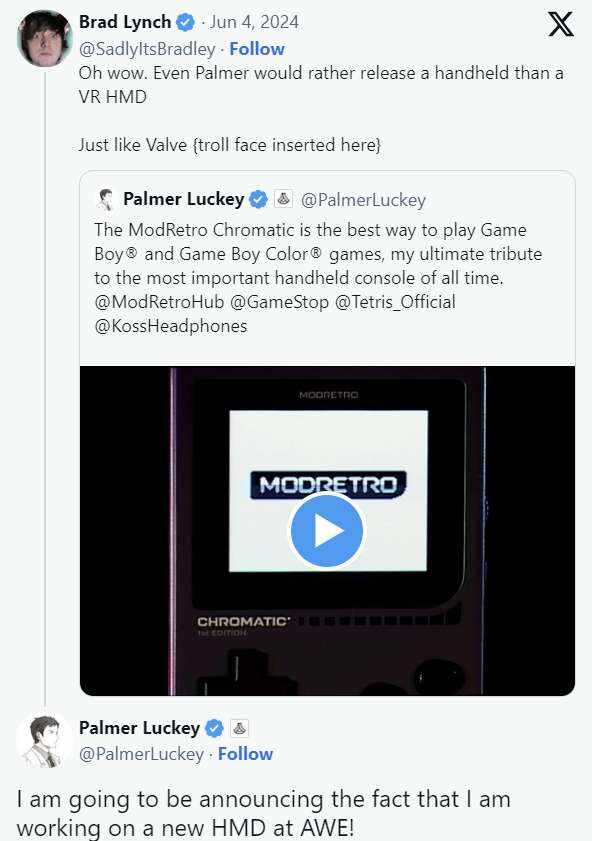Meta据报告对苹果VisionProThe release is optimistic that it will itself become themarketon the future of Android. But is this thinking flawed?
Citing "people familiar with the matter," the Wall Street Journal reported that Meta executives believe Apple's entry into the market will "justify Chief Executive Mark Zuckerberg's gamble to attract more consumers." The executives believe Meta will be a major competitor to Apple in the space computing space, playing the role of Android in today's smartphone market, the people familiar with the matter said.
在苹果Vision Pro公布的一周后,扎克伯格在接受Lex Fridman采访时表示,他认为苹果的产品对Meta在增强现实和虚拟现实领域的巨额投资是“一种肯定”。而在一次全员会议上,他告诉Meta员工,Vision Pro的发布使他“更加兴奋,并以多种方式对我们正在做的事情产生乐观,相信我们的工作会取得成功”。
However, there is a huge problem with Meta being called the Android equivalent in the XR (i.e. spatial computing) market.
Android is a semi-open software platform. Any phone manufacturer can integrate Android's open source core for free and without a license, and can integrate Google's services and the Google App Store by agreeing to specific compatibility standards and pre-installing a range of Google applications.
On the other hand, Meta QuestThe platform is dedicated to Meta's own devices. Its strategy is more like trying to be a second Apple than what Google did with Android. It sounds more like BlackBerry than Android, and the combination of iPhone and Android beat BlackBerry.
Furthermore, Google itself seems to be gearing up to be the Android of the XR space, as it's building a platform called "Android XR" to support Samsung's upcoming headset. The platform will be able to bring the full ecosystem of Android phone and tablet apps to the table, something it refused to provide for the Meta, while Samsung will be able to leverage its expertise in hardware and get preferential access to key components like OLED microdisplays from its subsidiary. While Samsung may have a period of exclusivity, it's almost certain (and has been reported) that it won't last long.
On the other hand, there is an important difference between the XR market and the smartphone market, which makes the application of these analogies limited.
Meta is selling its main Quest headset at cost or even at a loss. Unless there's a highly unusual split deal that would seriously impact Google's profits, it's unlikely that hardware companies like Samsung will be competing directly with the main Quest anytime soon, especially with the much-rumored Quest 3 Lite. Samsung's headset reportedly sells for around $2,000.
Until compelling headsets can be built at low cost, Meta will likely continue to monopolize low-cost mass-market devices, while Apple and Google compete for the smaller market of affluent early adopters.
However, Meta's strategy also undermines its reported long-term goal of becoming an Android-like player. While the company is reportedly working with LG on a future Quest Pro headset, it's unlikely that there will be such a partnership on the low-cost headset front because, again, unless there's a highly unusual split deal that would severely impact Meta's profits, most hardware companies have no incentive to enter this subsidized market segment. This market is similar to consoles in that the platform owners are also hardware providers, not smartphones.
Hardware partners must turn a profit in a market dominated by subsidies, a problem that may have been responsible for the collapse of the 3DO console in the 1990s, for many Android phone makers exiting the market in the 2010s, for the loss of the HTC Vive to the Oculus Rift, and for the Steam Deck becoming a first-party device instead of a device ecosystem like the failed Steam Machines-like device ecosystem.
While Meta had a 10 year lead over Apple and Google in the market, I think it mostly squandered that lead. Until 2018, it was primarily focused on PC VR, a market it has now largely abandoned. Since then it has not built its own software development platform beyond a series of fragmented integrations to game engines like Unity, nor has it built its own set of significant first-party apps beyond Horizon Workrooms.
Quest is a proven and successful gaming console today, but Meta has no clear path to make it a competitive general-purpose computing platform. meta also lacks a real moat beyond the game studios. the Quest headset uses the same Qualcomm chips and other displays that anyone can buy. And Google has its own world-class computer vision team.
To make matters worse, there are quality and design issues with the Quest system software and mobile apps. While I had expected these issues to be temporary preliminary stage problems while the company was in a busy transition period, the fact that the software's is still so unstable and imperfect in 2024 doesn't inspire a sense of optimism.
Meta's bullish view is that Meta's current software quality issues may be growth difficulties that can be resolved over the next few years. Apple and Google have never faced a fully vertically integrated competitor willing to subsidize the hardware driving their platforms. Without the ability to reach Quest's potential sales scale, Google's idea could fail as consumers opt for Meta's lower-priced options and richer content of true augmented and virtual reality content.
The pessimistic scenario, however, is that the Quest software could remain problematic if and when it enters the market as Google rolls out a well-polished alternative that features the Play Store and integrates with existing Android devices and services. That, coupled with high-quality hardware from partners like Samsung that enjoy existing retail and marketing capital, could make Meta an unappealing third option to the BlackBerry of spatial computing. In that case, all of Meta's investment and research would be as useless to it as Xerox PARC was to Xerox.
It's impossible to know exactly what the future holds for XR. It's even possible that a new entrant like Amazon or Valve could completely change the landscape. But what's clear to me is that despite tens of billions of dollars invested, Meta's emergence as a major competitor to Apple in space computing is far from certain, and will depend on the quality of execution, not just the size of the investment.
source:uploadvr
Related posts




